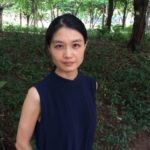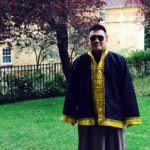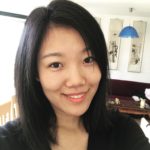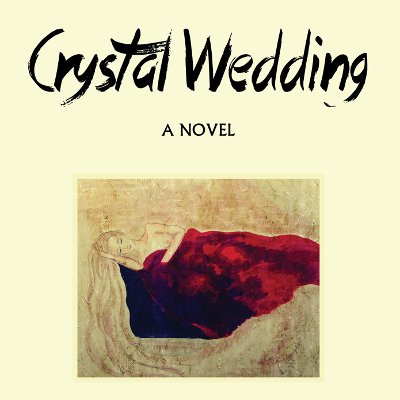Crystal Wedding by Xu Xiaobin
translated by Nicky Harman
2016, Balestier Press
Publisher's Blurb
Yang Tianyi is a “leftover woman” and under pressure to find a husband. She is attractive and intelligent but knows little of the world, and finally makes a disastrous marriage to a man, Wang Lian. At the end of the 1980s, in Tiananmen Square, she meets her love Hua Zheng again. However, after the political turmoil, Hua Zheng is framed as one of the perpetrators of the disturbances, and is sentenced to prison.
Set against the background of China’s turbulent 1980s and 1990s, Crystal Wedding is a novel of searing emotional honesty.
We're delighted also to include an insightful review by Dr Hu Xingzhou, translated from the Chinese by Megan Copeland and Nicky Harman.
Reading Chinese Network Reviews
Reviewed by Hsiu-chih Sheu, 8/1/18
 The story begins with a “leftover woman” crisis in the 1980s in China. Yang Tianyi, an attractive female writer finds herself still single at the age of 30. She is acutely aware of her intellectual abilities and she hides her feelings towards men. As time passes, the marriage pressure from her own family and neighbours becomes unbearable. After much picking and choosing, she marries Liam. “He was ugly, awkward, dull, wrong in all sorts of ways, compared to all the handsome guys she used to go out with.”
The story begins with a “leftover woman” crisis in the 1980s in China. Yang Tianyi, an attractive female writer finds herself still single at the age of 30. She is acutely aware of her intellectual abilities and she hides her feelings towards men. As time passes, the marriage pressure from her own family and neighbours becomes unbearable. After much picking and choosing, she marries Liam. “He was ugly, awkward, dull, wrong in all sorts of ways, compared to all the handsome guys she used to go out with.”
At the beginning, the marriage is happy as Liam is a caring husband and Tianyi is contented with her new family and relieved to leave her own horrible family behind. However, the tension with her terrible mother (and granny)-in-law is constantly boiling and could explode at anytime. She had had a number of platonic relationships with handsome male friends, but her first sexual experience is with her husband. This first sex encounter brings them a baby. The arrival of the baby boy brings more tension than joy to her life, and put a stop to their sex life for fear of another pregnancy. The symbolic meaning of sex as a burden rather than pleasure is an interesting theme in the story. For Tianyi, sex only brings burden and trouble, but the platonic love brings her endless happiness.
Tianyi’s disappointment with her marriage is intertwined with her memory for a number of relations she had at her 20s with the most talented and good looking young intellectuals in her circle. Among all them, Zhang is the one whom she loves the most. When Zhang gets involved in the 1980s Tiananmen Square protest and gets caught, she chooses to do all she can to rescue him at the expense of her own marriage. As a married woman, a successful author, she continues to attract handsome intellectuals from her literature circle. She craves their admiration and redoubles her efforts at work, only to return, in the evening, to a distressing and hopeless family home. Her only comfort is from her love interests from the present and the past.
Crystal Wedding is about a self-absorbed female intellectual who shows love and passion for her career and lovers, but holds indifferent feelings towards her own family. She constantly laments her unhappy marriage and yearns for her far away lovers. One might feel sorry for the single-minded “intellectual woman” for her lack of self reflection. Instead of setting Tianyi free, the intellectual world offers her excuses for her overblown self-indulgence. The story ends with her determination to divorce her husband, “she felt a grim determination grow within her--she would endure, no matter what,” but it does not suggest she will stop her self-absorbed life. The story provides a glimpse on the views of a female intellectual on sex during the 80s and 90s in China, but the portrait of a self-absorbed intellectual is still relevant today.
Nicky Harman makes the English translation read fluently like the original and builds a bridge for English readers to cross over to see the portrait of a female intellectual in China in the 80s.
Reviewed by Hsiu-chih Sheu
Reviewed by Sarah Darwin, 2/1/18
 Crystal Wedding tells the story of a young woman and her lengthy and unhappy marriage.Tying the knot with a 'nice guy’ before they have the chance to find out that they are utterly incompatible, the story follows them over the course of the next 15 years as their marriage deteriorates and implodes. The protagonist is Wang Tianyi, the wife, an intelligent, principled and talented woman, who is also painfully naive, frustratingly self-centred and often unkind. The narrative contains frequent flashbacks and several flash-forwards in which we learn more about Tianyi’s earlier life, including her dysfunctional family, her previous relationships that she unfailingly manages to sabotage before they’ve even started, and her career that is both stymied by others who scapegoat and use her, and undermined by her own unwise choices. Surrounding her are her circle of similarly hapless female friends and relatives who fare little better in life and love. All this takes place against the backdrop of massive social and economic change in China, taking in the Cultural Revolution, the unrest of Beijing in 1989 and the economically and sexually liberal 90s.
Crystal Wedding tells the story of a young woman and her lengthy and unhappy marriage.Tying the knot with a 'nice guy’ before they have the chance to find out that they are utterly incompatible, the story follows them over the course of the next 15 years as their marriage deteriorates and implodes. The protagonist is Wang Tianyi, the wife, an intelligent, principled and talented woman, who is also painfully naive, frustratingly self-centred and often unkind. The narrative contains frequent flashbacks and several flash-forwards in which we learn more about Tianyi’s earlier life, including her dysfunctional family, her previous relationships that she unfailingly manages to sabotage before they’ve even started, and her career that is both stymied by others who scapegoat and use her, and undermined by her own unwise choices. Surrounding her are her circle of similarly hapless female friends and relatives who fare little better in life and love. All this takes place against the backdrop of massive social and economic change in China, taking in the Cultural Revolution, the unrest of Beijing in 1989 and the economically and sexually liberal 90s.
Tianyi is a rather challenging protagonist. She frequently provoked anger and frustration in me, sometimes pity, and occasionally a stab of schadenfreude. Overall, she’s not terribly likable. Without attempting to understand her character, it would be difficult to appreciate the book. As the author explains in the bitter and scathing introduction, and as evidenced as you learn more about Tianyi’s life, she’s merely a product of her personal and social environment. As a girl, Tianyi’s prodigious love of literature leaves her with ridiculously unrealistic romantic ideals, and the values of “chastity, loyalty, and honesty” that were impressed on all girls leave her averse to sex and procreation. Later, as society becomes more liberal and women begin to find that sex and manipulation offer a route to power and success, Tianyi’s firmly held morals develop into an alienating arrogance.
One particularly interesting aspect of the story is Tianyi’s struggle to retain autonomy and independence after marriage and the effect this has on the reader. Given her situation, she could easily have seemed like a victim and garnered the reader’s sympathy, bringing us on side with the author's criticism of contemporary Chinese society as laid out in the preface. Yet in her quest for independence, Tianyi resolutely continues to pursue her career, her writing, her political interests, and even an old flame she still holds a candle for with little concession to her child and husband. As soon as she brings her infant son home from hospital she sets about weaning him off the breast and finding him a nanny, and instructs her husband to take him away for the night. She’s not without remorse for her sidelining of her son, and struggles against her overwhelming love for him, but in a way, her self-awareness seems to make her behaviour more unpleasant. Similarly, she expects an attentive, caring husband, but resents the limitations of marriage and the obligations that go with it. Her actions often come across as excessively self-interested, and you begin to wonder whether her apparently constant disparagement of her husband could be a major contributing factor to his explosive and destructive rages. And yet, if she were a man, would we consider her behaviour to be so selfish, or even unusual?
The raw emotion of the book is impressive. While a lot of the narrative is a straightforward linear account of Tianyi’s life, an occasional sentence or paragraph can skillfully manage to convey the sizzling excitement of a political gathering, the tension of a city on lockdown, or the pain and bewilderment of childbirth for a person completely ignorant of the process. Another skillful element of the storytelling is the male characters’ complete lack of depth, which serves to reflect the protagonist’s failure to see them as fully fledged individuals, instead projecting onto them her own fantasies and assumptions of their characters, based on little more than their appearance. I also appreciated the way the author’s voice seems to occasionally blend with that of Tianyi and her similarly hapless female friends and relatives. Sometimes it’s unclear whether the words are voicing a characters words or thoughts, or whether they are judgements straight from the author. This lends a deeply personal feel to the book, and a strong sense authenticity. Indeed, in the scathing and bitter introduction, Xu writes that the story is written in ‘blood and tears’.
Just to add some reassurance, the story isn't all doom and gloom. The characters all have various ups and downs, and I felt that Tianyi's tendency to reflect, and her growing self-awareness as she matures somewhat counterbalance the impact of the repeated hardships she endures/brings on herself.
Despite the downbeat subject matter, Crystal Wedding is a surprisingly readable book, which is aided by a skillful seamless translation by Nicky Harman. The story sometimes feels rather straightforward, and there aren’t any clever twists plot twists, but what it lacks in narrative punch is compensated by the unusual protagonist and the powerful portrayal of the sorry ramifications of social conditioning.
Reviewed by Sarah Darwin
Reviewed by Zahra Raja, 30/12/17
 Crystal Wedding was an odd read. Its oddness stems from a main character, Tianyi, who lives in a dream world because reality is a disappointment to her; this in itself is not a bad thing as Tianyi is constantly plagued by unfair circumstances, however the reader does lose the ability to empathise with her at certain points due to her bizarre outlook on life and inexplicable manner of dealing with problems. This is not to say that she has no redeeming qualities, however her tendency to bury her head in the sand costs her dearly in her personal life and is a source of great frustration to the reader. The cover befits the story, showing a semi-naked woman who is seemingly floating in mid-air and dreaming, rather like our heroine who floats between reality and fantasy and cannot seem to differentiate the two.
Crystal Wedding was an odd read. Its oddness stems from a main character, Tianyi, who lives in a dream world because reality is a disappointment to her; this in itself is not a bad thing as Tianyi is constantly plagued by unfair circumstances, however the reader does lose the ability to empathise with her at certain points due to her bizarre outlook on life and inexplicable manner of dealing with problems. This is not to say that she has no redeeming qualities, however her tendency to bury her head in the sand costs her dearly in her personal life and is a source of great frustration to the reader. The cover befits the story, showing a semi-naked woman who is seemingly floating in mid-air and dreaming, rather like our heroine who floats between reality and fantasy and cannot seem to differentiate the two.
The book is set 1980s and 90s, however the not insignificant political disturbances of that period, such as the Tiananmen Square massacre play second fiddle to Tianyi’s own emotional turmoil. It’s mentioned a few times that Tianyi isn’t interested in politics, so unlike the narrative in Wild Swans that is built on a foundation of political turmoil, politics in Crystal Wedding plays more of a background role in Tianyi’s life, which is actually somewhat refreshing. Tianyi has a miserable childhood, and ends up marrying Lian, the first man who is somewhat decent to her in order to escape. She is a self-proclaimed “aesthete”; beauty is the most important thing to her, and so when their marriage fails to live up to her expectations she channels her frustration into writing and art, arguably both at the expense of her husband and her son Niuniu, who do not fit into her fantasy world. We learn a lot about Tianyi from her relationship with her family; she resents having to take care of her son at the expense of living her life as she wants to and she doesn’t exactly put a great deal of effort into being a good partner to her husband. She leaves her son frequently with her in-laws and continues to pursue art and writing. As the novel progresses, one cannot shake the feeling that the deterioration of their family life is largely due to Tianyi’s lack of interest in maintaining it. We also begin to see an increasingly irate husband who becomes violent and abusive to both his spouse and son. However, Lian does not become a monster overnight. By all standards he wasn’t a terrible husband to Tianyi; he does not resent her career, and he seems to do most of the cooking and other household work. He doesn’t even begrudge her various affairs. Furthermore, Tianyi seldom prioritises her family over her career and it is thus hard to sympathise with her at the final outcome.
However, Tianyi’s devotion to honing her craft isn’t all bad. We see her successfully write a bestselling novel that is turned into a film, join the production company, and quit after mistreatment, blazing a trail of cutting insults behind her. Tianyi’s success in her career is limited because she does not know, or does not wish to know how use politics to her advantage, something that is oft repeated throughout the novel, “Her failure lay in being too honest”. (The author comes across as a bit didactic in this sense; it is obvious that she is criticising those in literary circles and other such groups who use such means to achieve their ends.) For all of Tianyi’s weaknesses, she is determined to live for herself and pursue her dreams, political instability and family responsibilities be damned. This is a rather unusual trait, as the reader has come to expect a self-sacrificing heroines in such books.
Ultimately, Tianyi’s frustrating character detracts from the novel. She has a habit of letting potential love interests slip through her fingers, and messes up spectacularly with Hua Zheng, who is her greatest love of all. Throughout the novel she ages, though never really going anywhere both in her personal life and her career. The only hint we have of her future is a throwaway comment from the author that a grown Niuniu will give his mother fashion advice, which reassures the reader that perhaps Tianyi may have a happy ending with her son despite the lack of progress in her life. Nicky Harman did a brilliant job in translating and bringing Tianyi’s complexities to life, and I would definitely read other works that she has translated.
Reviewed by Zahra Raja
Reviewed by Barry Howard, 30/12/17
 The publisher states that Xu Xiaobin is one of the most widely acclaimed literary writers in China; the winner of numerous prizes. Favourable reviews suggest this is a book that stands alongside Jung Chang’s “Wild Swans”(the political aspect)or is to be read if you enjoyed Margaret Atwood’s “The Handmaid’s Tale”(the feminist aspect).
The publisher states that Xu Xiaobin is one of the most widely acclaimed literary writers in China; the winner of numerous prizes. Favourable reviews suggest this is a book that stands alongside Jung Chang’s “Wild Swans”(the political aspect)or is to be read if you enjoyed Margaret Atwood’s “The Handmaid’s Tale”(the feminist aspect).
Wild Swans brought to the attention of the English-speaking world the savagery of political campaigns and the suffering of millions under Chairman Mao. In Crystal Wedding, Tiananmen Square is merely the 1989 incident the Chinese government refer to it as. There is nothing in the book to suggest it was a massacre (the back cover calls it a disturbance).
Difficult to see that Xu Xiaobin had any intention of expressing political dissent. Perhaps the publishers thought that mentioning Tiananmen Square would sell more copies. Once the reading starts, Crystal Wedding seems much more interested in tackling feminist issues–namely the pressures of Chinese women to marry and produce a son. Yet it does so in such a humdrum way. The first third of the book is like being told about the love life of someone you don’t know or have no interest in. Only when Hua Zheng (the lead character’s real love interest) appears does the story spark into life.
Unfortunately, that spark is quickly quashed and the remainder of the book morphs into some kind of diary. The third-person narrative starts standing out and I felt completely distant from the protagonist. If we’d had the perspectives of other characters, then this might not have been so noticeable; but it’s all about the protagonist Yang Tianyi.
The end of the book has the author apparently displaying deep insights in to the world outside of China with references to Western literature, art and classical music. We are told that Czechs are all gentle and Americans were supposedly broken by ‘9/11’ (because before that they were all innocent and friendly). Overall, the mentions of trips to the USA seem to portray classic culture shock – finding everything so wonderful on a first visit and then discovering the other side of paradise on a subsequent trip.
Milan Kundera’s The Unbearable Lightness of Being is mentioned three times at least throughout the book. Perhaps this was Xu’s attempt to write under its influence – producing a character who regrets her life choices. The problem is that her character’s options are now dated. Having written the book in 2012, the author would know that educated women in 21st Century urban China can follow their elder Taiwanese and Japanese sisters by electing to reject marriage if it is constrained to traditional models of a child-bearing housewife.
Ultimately, I was left wondering who this book was written for. It’s like a draft that has yet to be edited or proof-read. Too many times, characters and situations just seem to materialise out of nowhere. The hyper-sensitivity over Tiananmen Square means the original won’t be read in China. As a piece of Chinese literature translated for Western readers there’s little sense of time or place. Difficult to see anyone gaining any understanding of any aspect of China or the Chinese from this novel.
Reviewed by Barry Howard
Reviewed by Todd Foley, 28/12/17
 Several years ago I provided simultaneous translation for a Chinese company that developed tools for assessing emotional intelligence. While at the time I was a bit skeptical, encountering the protagonist in Crystal Wedding has now made me wish I had retained some of the content of those meetings. As author Xu Xiaobin notes in her preface, the novel’s main character, Yang Tianyi, “is, without a doubt, a girl of ‘low EQ.’” Xu is referring to what she sardonically calls a “Chinese-style” EQ, which means nothing more than knowing how to charm a man. Upon reading the novel, it soon becomes clear that the protagonist’s EQ is presumably quite low by a more conventional understanding of the term as well. The story unfolds over a period of fifteen years—between 1984 and 1999, specifically—which coincides with the unhappy duration of Tianyi’s doomed marriage. Tianyi is a writer and artist who struggles to cope, rather unsuccessfully, with a variety of suffocating aspects of her life—her hot-tempered family, her seemingly bi-polar husband, motherhood, her sexual inhibition, and the political crackdown following the 1989 Tian’anmen protests. The relatively engaging plot of the novel consists of a series of events in her daily life and involves a number of chatty side stories that help to illustrate the historical context in which these events occur.
Several years ago I provided simultaneous translation for a Chinese company that developed tools for assessing emotional intelligence. While at the time I was a bit skeptical, encountering the protagonist in Crystal Wedding has now made me wish I had retained some of the content of those meetings. As author Xu Xiaobin notes in her preface, the novel’s main character, Yang Tianyi, “is, without a doubt, a girl of ‘low EQ.’” Xu is referring to what she sardonically calls a “Chinese-style” EQ, which means nothing more than knowing how to charm a man. Upon reading the novel, it soon becomes clear that the protagonist’s EQ is presumably quite low by a more conventional understanding of the term as well. The story unfolds over a period of fifteen years—between 1984 and 1999, specifically—which coincides with the unhappy duration of Tianyi’s doomed marriage. Tianyi is a writer and artist who struggles to cope, rather unsuccessfully, with a variety of suffocating aspects of her life—her hot-tempered family, her seemingly bi-polar husband, motherhood, her sexual inhibition, and the political crackdown following the 1989 Tian’anmen protests. The relatively engaging plot of the novel consists of a series of events in her daily life and involves a number of chatty side stories that help to illustrate the historical context in which these events occur.
Tianyi experiences a series of personal dilemmas throughout the story that lays the groundwork for a potentially rich and complex literary exploration: she loves her child but feels shackled by him; she decides not to pursue the only man she has ever loved after he is finally released from a decade-long prison sentence; she holds onto certain political ideals while her husband tosses them aside for his own professional advancement; and she willfully relinquishes her position as a well-regarded artist and writer to others whose work she feels is substandard. Who is this fascinatingly emotional, intellectual, and idealistic woman who struggles so mightily with her own desires and seems perpetually given over to self-sabotage and self-denial?
While to me this seemed like one of the novel’s central questions, it is not really one that is effectively explored within the book itself. Because the narrative style presents Yang Tianyi’s conundrums so directly and explicitly, yet at the same time introduces almost no critical distance between the protagonist and her actions, these interesting conflicts tend to be reduced to a series of simply construed black-and-white choices. The intriguing nature of Yang Tianyi—passionate yet defeatist, driven and defiant yet apathetic—suggests her continuous attempt to negotiate her past trauma with her present experience, but the subtleties of this process, which presumably give rise to such a unique character, remain lost between an overly explicit narrative omniscience and an unsatisfactorily reflective protagonist.
While this may be a certain literary shortcoming, it is an aspect of the novel that does raise other interesting questions. The author’s preface to the novel gives the impression that the story that follows is largely based on her own dreary experience as a woman and as a writer in the post-Mao decades, clearly framing it in a very personal manner. Reading the novel as a kind of fictionalized memoir makes the lack of distance between the narration and protagonist’s inner struggles seem more appropriate, and in this light it becomes a more interesting study of how the scars of the past seem to have kicked off a cycle of desire and defeat for Yang Tianyi that she seems unable to recognize or resolve, and which traps her in a repetitive stasis rather than propelling any sort of convincing personal growth.
For better or worse, Crystal Wedding stands apart from other literary accounts of post-Mao life in a number of ways, the most thought-provoking of which may be as a sort of paradoxical anti-Bildungsroman in the face of remarkable historical change. Such an unwavering focus on the protagonist’s personal, emotional struggles, furthermore, presents a valuable perspective in this field of literature so often focused on political and historical issues. Despite my certain reservations, I would go as far to say that, in translator Nicky Harman’s experienced and professional hands, the story is smooth and engaging enough to be considered a relative page-turner, and I would not regret a plane ride or train trip spent reading it.
Reviewed by Todd Foley
Reviewed by Cuilin Sang, 26/12/17
 In the preface, the author Xu Xiaobin describes her novel as “the first book by a mainland Chinese author to speak so frankly about sex and Chinese women.” Considering the fact that it was published in 2012, it seems a bit of an exaggeration. Frank description of sex had appeared in Chinese women authors’ works long before 2012. According to the China Daily article written by Mei Jia in August 2010, since the late 1980s there had even been a group of “body writing” authors who “depicted private, often sexual, experiences.” Moreover, Xu’s focus in this book is not so much on sex as the frustrations in love or sexual relationships.
In the preface, the author Xu Xiaobin describes her novel as “the first book by a mainland Chinese author to speak so frankly about sex and Chinese women.” Considering the fact that it was published in 2012, it seems a bit of an exaggeration. Frank description of sex had appeared in Chinese women authors’ works long before 2012. According to the China Daily article written by Mei Jia in August 2010, since the late 1980s there had even been a group of “body writing” authors who “depicted private, often sexual, experiences.” Moreover, Xu’s focus in this book is not so much on sex as the frustrations in love or sexual relationships.
The frustrations encountered by the protagonist Yang Tianyi, are predictable. In the preface Xu fondly categorizes her as a “low-EQ” girl, in a social context where “careful calculations” are needed for a woman in any attempt to “charm” her boss or her man. It is therefore baffling that Tianyi, the woman who’s supposed to be loyal to her true feelings and emotions, would choose a husband she doesn’t feel passionate about, when clearly other options are also available. The main reasons, other than the fact that she urgently needs to get away from her family, seem to be that she has convinced herself that true love shouldn’t be defiled by marriage and that marrying a man who loves her more forecasts a peaceful and happy marriage. The question then is, how is this different from the “calculating” that is so despised by the author?
It is only predictable that Tianyi’s marriage life will be an unhappy one. The rancor accumulated over the years towards her husband, whose most heinous behavior would be shouting and throwing things around the house, seems to have also affected her feelings towards her son. Seeing more and more qualities of her husband become manifest in her son, Tianyi grows bitter towards her son as well. It seems that she feels trapped in this suffocating marriage, for reasons not entirely clear. The only explanation would be her own unwillingness or inability to leave. Various sketchy portraits of men in her life incessantly supersede each other, and in sequence they are all faced with the inevitable yet sometimes enigmatic failures in connecting with her. They somehow all fall short of her expectations, which even herself admits, are improbable ones in real life. In the meantime, professionally she is portrayed as a quite successful woman. Principally a scholar on homosexuality, she also succeeds dazzlingly as a painter, a novelist, and a playwright. Even if it is quite possible for a woman as a frustrated wife to succeed as a talented artist/scholar, the successes of Tianyi come as baffling as the failures in her relationships, for lack of both detail and contextualization. The inconsistencies in both aspects in her Janus-faced life undermine the credibility of the work as fiction, as paradoxical as this may sound. The character is hard to relate to, not because she is too perfect, but because she is too blatantly self-involved. In other words, the author seems to be too emotionally invested to be objective, and the boundaries between autobiography and fiction start to blur.
The inconsistencies occur at the level of the narrative as well. Starting from Chapter 2, the narrative becomes more convoluted and cyclical. It is not clear whether this is a technical ruse, or just inadvertently repetitive. It seems like the introduction to the main character Tianyi has never finished and it just starts over and over again. And in these chaotic cycles sometimes the distinctiveness of the characters is compromised. For example, Tianyue, Tianyi’s sister is introduced as “someone who was ruled by her emotions” on page 179, and then Tianyi is described as “a woman ruled by her emotions” eleven pages later. Similarly, the phrase “many years later” is repeated on a regular basis to imply a dramatic change in the future, which usually doesn’t get picked up again. It even appears in the later chapters, when clearly an ending instead of a climax is approaching. As impeccable as the translation is, Crystal Wedding in its own right is an unfinished work on many levels, where abundant threads, such as Tianyi’s artistic passion and inspiration, her relationships with her friends and siblings, her political belief and cross-cultural observations, her feminist stance, her Platonic love, etc., await further developing.
Reviewed by Cuilin Sang
Reviewed by Paul Woods, 19/12/17
 This book is not an easy read, as it details a woman’s life of frustration and lack of fulfilment, set against a background of traumatic events and great change in China. The author claims not to be a political person, yet the book is political in a broad sense. It is also a cultural critique, yet it has something of an autobiographical feel as well.
This book is not an easy read, as it details a woman’s life of frustration and lack of fulfilment, set against a background of traumatic events and great change in China. The author claims not to be a political person, yet the book is political in a broad sense. It is also a cultural critique, yet it has something of an autobiographical feel as well.
The main protagonist of the novel, Yang Tianyi, misses out on a number of promising young men and then marries a man who turns out to be very unsuitable. The story is the unfolding of her life as a person unfulfilled, trapped by her own poor choices and their consequences, as well as by genuine misfortune and socio-political realities.
Although attractive and intelligent, Tianyi seems to have problems relating to people. For fear of making a mistake or coming across wrongly, she did not engage with a number of men in her youth, and even missed out on marrying Hua Zheng, the love of her life.
She is unable or unwilling to engage with a society which is modernising and moving on, appearing alienated and marginalised. She comes across as trapped in some kind of romantic and intellectual bubble which makes it hard for her to relate to the real world. After her son is born she struggles with being a mother. In the aftermath of the 4th June incident in 1989 she takes him son out on a bicycle, shocking her friends, who find this dangerous. When arguing with a film company over the matter of screenplays she appears out of touch. As I became more familiar – and frustrated – with her, while the story speaks of her childhood obsession with Lin Daiyu, I was reminded of the older Douzi (Cheng Dieyi) in Farewell my Concubine. Both are tremendously creative and artistic people for whom the real world seems awkward and who prefer romanticism and idealism.
Tianyi is a victim of both circumstance and her own weakness, yet also creates problems for others. I found myself feeling sorry for her and becoming angry with her, sometimes even at the same time. Her relationship with her husband is a disaster, and he is certainly not a good husband, yet there are many times in the story when she could have behaved better and did not have to provoke him. She has similarly complex relationships within siblings, friends, and work colleagues. Why is she so hard to deal with?
The book is not political, yet while reading it, I wondered if the male characters were somehow representative of the Communist Party. Both come across as unfeeling and unable to discern the needs of those they claim to take care of. Men and Party are flawed, insensitive to the deepest needs of the ‘other’. Only Hua Zheng really understands Tianyi and truly appreciates her, yet in many ways he is an illusion, an elusive figure who barely exists in reality. Is he a metaphor for that perfect political group which could meet all of a nation’s aspirations?
I read this book after Northern Girls and found it interesting and challenging to compare the two. I am familiar with intellectuals in China and have seen the change in the country over the last 30 years or more; in theory, Tianyi’s world is much more likely to overlap with mine than Qian Xiaohong’s. Yet it is easier to spend time with Xiaohong than with Tianyi. For all her faults, Xiaohong is trying to improve herself and pull herself up by her own bootstraps; the narcissistic and rather self-obsessed Tianyi is rarely satisfied and in a way squanders the advantages her upbringing and education have given her. In fairness to Tianyi, there is much more personal reflection in The Crystal Wedding and we are given greater access to her thought life than the inner world of Sheng Keyi’s protagonist.
Nicky Harman’s translation is a pleasure to read. Its smoothness and precision facilitate understanding without ever getting in the way. It is a mark of her skill that one can engage with this story in idiomatic English without losing the sense that it is a narrative about China.
Reviewed by Paul Woods
Reviewed by Tamara McCombe, 17/12/17
 Crystal Wedding by Xu Xiaobin is a whistle stop tour of China’s social conscience from the 1960s to the 1990s as seen through the eyes of ‘leftover woman’ Tianyi. The term ‘leftover women’ ("sheng nu") has been aggressively disseminated by the Chinese state media since 2007 via its surveys, news reports and cartoons stigmatising educated women over the age of 27 or 30 who are still single. Although no longer featured on any of its literature, ‘leftover women’ is still a popular designation in Chinese society. It is a campaign born from the male dominated gender imbalance which occurred as a result of the Chinese government’s family planning policy, popularly misdubbed the “one child policy” in the West, as it attempted to control the country’s population size. Although there is a healthy pool of bachelors they tend to "marry down", both in terms of age and educational attainment. One such ‘leftover’ woman in a BBC interview explained "There is an opinion that A-quality guys will find B-quality women, B-quality guys will find C-quality women, and C-quality men will find D-quality women. The people left are A-quality women and D-quality men. So if you are a leftover woman, you are A-quality." This is how Tianyi arrogantly views herself. She resents having been forced by society to marry a man less intellectually capable than her. "A-quality" women of intelligent like Tianyi are who the government most wants to procreate, according to American sociologist Leta Hong Fincher, it is an attempt to upgrade the quality of the population and to reduce the restless, single men who could cause social havoc.
Crystal Wedding by Xu Xiaobin is a whistle stop tour of China’s social conscience from the 1960s to the 1990s as seen through the eyes of ‘leftover woman’ Tianyi. The term ‘leftover women’ ("sheng nu") has been aggressively disseminated by the Chinese state media since 2007 via its surveys, news reports and cartoons stigmatising educated women over the age of 27 or 30 who are still single. Although no longer featured on any of its literature, ‘leftover women’ is still a popular designation in Chinese society. It is a campaign born from the male dominated gender imbalance which occurred as a result of the Chinese government’s family planning policy, popularly misdubbed the “one child policy” in the West, as it attempted to control the country’s population size. Although there is a healthy pool of bachelors they tend to "marry down", both in terms of age and educational attainment. One such ‘leftover’ woman in a BBC interview explained "There is an opinion that A-quality guys will find B-quality women, B-quality guys will find C-quality women, and C-quality men will find D-quality women. The people left are A-quality women and D-quality men. So if you are a leftover woman, you are A-quality." This is how Tianyi arrogantly views herself. She resents having been forced by society to marry a man less intellectually capable than her. "A-quality" women of intelligent like Tianyi are who the government most wants to procreate, according to American sociologist Leta Hong Fincher, it is an attempt to upgrade the quality of the population and to reduce the restless, single men who could cause social havoc.
The protagonist Tianyi is a fickle woman. She adores her son, yet sees him as a hindrance to her freedom and professional development; she marries to leave the social pressures of her family home but complains about her simple husband even though he works hard, cooks, leaves her to write and makes no complaint about her leaving him and their son whilst she travels abroad to promote her artistic work; she feels that men should make the first romantic move yet mourns the fact that the love of her life escapes her grasp. She is also dangerously selfish, taking her son into the throngs of the violent chaos of the 1989 Tiananmen Square student protests without caring for his safety, and ultimately is hard to feel fond of.
Xu’s novel is an embittered treatise against the Cultural Revolution and the treatment dealt to those of an intellectual persuasion, especially the youths who were denied education. Her most artistic criticism of the period is when she uses the flowers sold in a market as a metaphor for the ‘sent down’ youths “So many gorgeous fresh flowers in this life ended up as slag.” Xu’s sharp emotion erupts from her personal experience of being sent down to Heilongjiang to break her back and spit blood from the strain of working the wheat fields. It also stems from her intellectual parents’ struggle to feed their love of the arts in an era when such pursuits could cost you your life. As a child, Xu was handed the works of many feted Western authors such as Balzac, Turgenev and Stendhal, who Tianyi refers to in Crystal Wedding. Tianyi is clearly Xu. For instance, both Xu and Tianyi work as screenplay writers at television production centres. Xu is frustratingly petulant in that she is like bloggers today who forget that even if you are writing alone, once you publish your written work, although you cannot see your readers, you are airing your dirty laundry. Translator Nicky Harman had to completely change some character names and addresses in her English translation as they revealed true identities and locations.
On a superficial level this is an easy and entertaining read. The lack of scenic description or cultural references and emphasis on emotion enables a reader from any culture to pick up this book. Harman’s translation very much aids the bridge between Chinese and other cultures by seamlessly weaving in Chinese references in way that does not require further research by the reader. For instance, she translates the foodstuff as ‘jiaozi dumplings’ as opposed to simply ‘jiaozi’ so that those not familiar with Chinese cuisine can instantly picture the moment. Harman also punctuates the text so that it flows in a style familiar with Western audiences.
However, Xu would most likely be unwelcoming to a verdict of her work being simply entertaining. In her preface, she professes Crystal Wedding is more than a novel for amusement, claiming it is the first to confront the topic of sex frankly. This is untrue, the likes of semi-autobiographical Shanghai Baby by Wei Hui covered this before Crystal Wedding. It is also not the first piece of modern Chinese fiction to turn to the topic of ambitious women who have borne the burdens of being sent down, Balzac and the Little Chinese Seamstress from Dai Sijie before Xu’s work also touched on this. Crystal Wedding is clearly the passionate fictionalised autobiography of a woman who has seen China’s modern political, economic and social turmoil, not something to be viewed lightly, yet it cannot be classed as a unique text.
Reviewed by Tamara McCombe
Reviewed by Henry Yunwei Wang, 13/12/17
 'Wedding Anniversaries: Year One, Paper: First joined, the bond thin as paper; Year two, Poplar: Drifting like the leaves of a poplar tree...' and so on. Her eyes scanned the page until 'Year Fifteen' caught her eye. 'Crystal: Lustrous, bright and dazzling.' She stared at it blankly. 1984 to 1999, fifteen years. A lustrous, bright and dazzling crystal wedding! The name was lovely, but surely glass would have been a better name? So very breakable.
'Wedding Anniversaries: Year One, Paper: First joined, the bond thin as paper; Year two, Poplar: Drifting like the leaves of a poplar tree...' and so on. Her eyes scanned the page until 'Year Fifteen' caught her eye. 'Crystal: Lustrous, bright and dazzling.' She stared at it blankly. 1984 to 1999, fifteen years. A lustrous, bright and dazzling crystal wedding! The name was lovely, but surely glass would have been a better name? So very breakable.
Along with a searing emotional honest preface based on author's formative suffering experience and her article "Amid a Sea of Red Flags" (English PEN Atlas), renowned Chinese writer Xu Xiaobin's Crystal Wedding (finely translated by Nicky Harman, published by Balestier Press) tells the story of a 1950s generation intellectual and also "leftover woman" (I wouldn't appreciate this phrase) who wed under pressure when she was over thirty. It narrates Yang Tianyi's best fifteen years (1984-1999) between her disastrous marriage and apathetic divorce, her relations with husband Wang Lian and unsuccessful affairs with beloved Hua Zheng, her failure as a mother as well as her relationship with her own mother.
Crystal Wedding reads more like a roman-à-clef. It gives a truthful account through the heroine’s eyes of what happened in barren China, spanning from the paralysing political turmoil period to the turbulent 1980s/1990s. Over the years, it has been ingeniously introduced to the audience, with subtle, skilful flashbacks and slowly unfolding narratives, the main character Tianyi's strengths and vulnerabilities amidst a series of conflicting pressures. Her painful dealing with a loveless and ill-suited marriage, her bleak seeking out ‘true love’ and lasting companionship face many Chinese women of her age.
Horrific physical exploitation, the hidden and ineradicable cruelty of sexual repression indeed, and sexual ignorance, and emotional destruction. As a tragic female identity, Tianyi's enduring hardiness reveals how Xu's topics tread two lines between the public sphere and the private domain in this novel: intimacy and sexuality, political and cultural awakening. Moreover, the unhappy marriage depicted shares parallel similarities with the chaotic backdrop, when an individual’s will and expression have been suppressed. Tianyi also serves as a shadowing spokesperson of Xu. The authorial voice is explicit clear when the character sharply criticizes corruption and artful, parasitic ‘chameleon-like' counterparts in the literary cliques. Indeed, one after another staid storytelling of sex and femininity, increase and decrease in internal plus interpersonal conflicts, further essayistic flourishes on intellectual ambitions with detailed historical portraits, Xu is aware of the fraught concerns with society and surroundings in her literature. It is those moralistic struggles made by Tianyi and Xu's brilliant words that bring Chinese female perspectives to light.
"Love (in relationship) is the biggest illusion." Tianyi is intelligent and capable and yet is sexually naive and inhibited. "She was too much of an esthete, constructing a perfect love in her imagination; in reality, she completely lacked the skills and the courage to fall in love." Neither Tianyi nor her husband, Wang Lian, however, has any idea of long-term emotional attachment. Consummation of their marriage took a week, and Tianyi was soon life-sentenced to her baby boy Niu Niu as an unprepared mother. Loud quarrelling never stopped when Lian converted from a committed and likeable husband to a violent and cantankerous father. He even unwisely felt jealous of her own wife's literary success --particularly when Tianyi acted as the breadwinner. Tianyi's great platonic lover is Hua Zheng, an intellectual activist who is much more her type than her husband. By Zheng's related narration mirroring 1980s/1990s' China, Xu emphasized how this country's spiritual and metaphysical traditions had been downgraded in cruelty and blindness. Finding no solutions in porn tapes, masturbation or female partners, Tianyi became more and more frustrated. Chaos and unhappiness reached its peak when the capricious husband walloped Niu Niu, and they got divorced. Free at last, Tianyi took up an invitation to go on a lecture around America and headed off to Las Vegas and Rocky Mountain University.
It was particularly remarkable how Xu shaped these "iron girls" behind the "leftover women," a generation in a revolutionary political climate who have been ruthless sacrificed and gradually forgotten. Xu's ironic charisma was evident and realistic when she makes the comparison with Tianyi and her Taiwanese cousin: "Her cousin...not exactly pretty but sweet-tempered, the kind of face rarely seen on the mainland. She was sweet-tempered in the way women used to be, a legacy from the Republican era...a lily-white complexion...as if her skin had never seen the sun, a mark of her true Chinese heritage. Women on the mainland hah had years of being toughened by labour. The times they lived through had left them soiled and weather-beaten, making them more masculine, stronger, and more resourceful than men." Xu speaks from experience. She herself was ‘sent-down’ to the province of Heilongjiang in her adolescence as a submissive and subservient "Iron girl," labouring alongside men in fields and factories, undertaking the most debilitating acts of manual labour, enduring inhuman treatment. Those leaders "Good girls," robbed all their desire and femininity in their youth, even had to bribe senior peasant officials with flirtatious manipulation and sex in order to get back to city homes. Lost everything in their golden time and soon their "Iron bowl" occupations when the "Open and Reforming" Policy launched; Equipped with merely skills and knowledge in the capital era, finally encounter every day with you in their forms of revenge: Sweeping luxurious brands or dancing in the city square with loud music. One generation, billions of primary dreams, from "Iron girls" 铁娘子 to "Chinese aunties" 中国大妈. Angry aunties' lessons somehow pass to descendants veering to the opposite theme of pleasure seeking, self-centred, promiscuity, scepticism and mammonism.
The publication of this book abroad is an indication of the healthy vibrancy of modern Chinese writing, but also is a mild test of censorship boundaries when authorities ratchet control over literary spheres. Given the fact that Chinese literature in English translation may be a niche market limited to academics and people with special interests, why not admit this and then look for a vigorous market in that niche? It is optimistic to see there are increasing platforms now available for Chinese writers and their audiences. Those funding opportunities and cultural events all provide support for such genuine voices outside of state bodies, which should not be overlooked.
An extraordinary and unusual story which can travel from film to book or vice versa. For readers who relish this style of fiction and background setting, I also recommend Chinese TV dramas available on YouTube, such as 金婚 Golden Wedding, 父母爱情 Parents Love, 激情燃烧的岁月Years of Burning Passion, 历史的天空 History of the Sky, films like 蓝风筝 Blue Kite, 天浴 Xiu Xiu: the Sent Down Girl, and 阳光灿烂的日子 In the Heat of the Sun.
Reviewed by Henry Yunwei Wang
Reviewed by Cynthia Anderson, 28/10/17
 In Crystal Wedding, Xu Xiaobin explores the fractured societal relations that permeate modern China and their deep impact on women. Against the backdrop of the rapid change and economic growth of the 1980s and 1990s, we experience the world through the eyes of Yang Tianyi, a female intellectual who struggles to find her place in a society that neither values intellectuals nor women. And ever present is the long shadow of the Cultural Revolution, the political movement Tianyi endured as a child, which unmoored her generation from the moral ideas and values of China’s past.
In Crystal Wedding, Xu Xiaobin explores the fractured societal relations that permeate modern China and their deep impact on women. Against the backdrop of the rapid change and economic growth of the 1980s and 1990s, we experience the world through the eyes of Yang Tianyi, a female intellectual who struggles to find her place in a society that neither values intellectuals nor women. And ever present is the long shadow of the Cultural Revolution, the political movement Tianyi endured as a child, which unmoored her generation from the moral ideas and values of China’s past.
The novel begins when thirty-year old Tianyi, ‘alternating between hope and despair,’ sets out to find a husband. Desperate to escape her mother and brother who treat her as if ‘she was no more than empty air,’ Tianyi meets Wang Lian. Since both grew up when the state ruled the private lives of ordinary people and sex was taboo, their mutual ignorance leaves Tianyi not only disappointed in sex but pregnant. She quickly realizes that motherhood means sacrifice and fears she has fallen from one bad situation into another. Though she carves out some space to write and lecture, Lian grows increasingly angry with her absences while her son, Niuniu flounders at school. Tianyi longs for love but with the men she meets, she hides her true feelings and always misses her chance.
Tianyi is a woman with one foot in the past and one in the present. The novel opens with a fortune teller predicting she will soon marry and she herself is skilled at reading the Yijing hexagrams people use to weigh choices. She believes in fate, ‘dire things always happened to her in the Year of the Snake, her birth year.’ And as a teenager Tianyi suffered from insomnia because of her obsessive reading of The Story of the Stone, the famous Qing dynasty novel about the tribulations of the Jia family and their inability to produce good sons. One of the themes of that novel is the tension between the ideal world and the actual world, which clearly leaves an imprint on Tianyi. ‘She was an aesthete, she put beauty above everything, she preferred fantasy to reality.’ Remarking on coasters with finely embroidered lotus flowers, Tianyi feels moved. ‘They seemed to give her a peek into the lives of women generations before. She thought of her mother and her maternal grandmother…and felt a rush of admiration for these old-fashioned women. Perhaps tradition had something going for it after all.’
And yet Tianyi lives in the New China where women are meant to liberated and ‘holding up half the sky.’ She wants to write and ‘feels torn between her love for her child and a dreadful feeling that having a child was a life-sentence.’ Deeply self-absorbed she aborts her second child and argues with Lian, who says, ‘You have no sense of responsibility to your family.’ She hasn’t given her son the love he deserves, the love she didn’t receive from her own mother, and she feels ashamed. ‘She hid her shame deep inside her, but it was exquisitely tender to the touch. Good mothers needed to love selflessly. She was not a good mother.’ When Lian doesn’t try to have sex with her for six months, Tianyi ‘has far too much self-self-respect’ to talk to him about it. ‘She was utterly conflicted: intellectually open-minded, in her behavior very conservative. She believed that the man should always make the first move.’
It is this tension between the past and the present, the real and the unreal for women in modern China that Xu Xiaobin brings to the forefront in her novel. Tianyi has one foot in the past because like many women in China she experiences discrimination in the workplace, sexual harassment and domestic violence. And she sees no way out of this situation since women are voiceless. There are far fewer women than men in the Communist Party and women cannot reach positions of political power when they are forced to retire ten years earlier than men. Since public protests and demonstrations are banned, the ability for women to challenge these social conditions are almost non-existent as the arrest of the Feminist Five in 2015 for using performance art to draw attention to women’s issues demonstrated.
Toward the end of the novel Tianyi visits the United States to lecture about her writings. ‘She felt as if she had been born here. How clean, innocent, friendly and unthreatening these winks (from strangers) were!’ And yet in the back of her mind she cannot forget that in Beijing, ‘in a very ordinary apartment building, she had a violent husband and a weakling of a son.’ She muses about the consequences of the New China whose rulers had been ‘extremely hostile to the educated class, targeting them in one movement after another. By the modern era there were no traces left of the moral principles of China’s ancient scholars. Tianyi often lay awake worrying about what kind of race the Chinese would turn into if things carried on like this.’
Nicky Harman’s excellent translation makes Crystal Wedding flow with great ease. The novel challenges our understanding of female liberation in China by providing insight and truth on what it means to be a woman in modern China.
Reviewed by Cynthia Anderson
Reviewed by Andy Thomas, 15/10/17
 Xu Xiaobin gives her own account of the written style of this book in what she establishes as her Preface. Her strength is her long episodic stretches of narrative, unemotional, with only short illustrations in dialogue. Overall the story leads inevitably from marriage, consummation and birth, to divorce, at her heroine Tianyi’s fifteenth wedding anniversary, her Crystal year.
Xu Xiaobin gives her own account of the written style of this book in what she establishes as her Preface. Her strength is her long episodic stretches of narrative, unemotional, with only short illustrations in dialogue. Overall the story leads inevitably from marriage, consummation and birth, to divorce, at her heroine Tianyi’s fifteenth wedding anniversary, her Crystal year.
It is a very careful and precise voice of summary, of episodes written as comptes rendus, which together sum up a marriage and a life at a time of great change. The text follows a loose forward sequence but the comptes refer backwards in time when necessary. She does not write explicitly about politics, but the re-alignment of China from the shadow of the Soviet Union to the sunlight of (pre-9/11) USA affects her life profoundly.
In her account of the Cultural Revolution and a woman’s life in the years afterwards, I am reminded of that generation of British women for whom the Second World War was a liberation from farm work into the mechanical trades, who then afterwards became tied to their new husband’s kitchen, seeking a way to escape a society that knew but didn’t care.
Here Xu’s life in the Preface seems to follow ”a woman like her [Tianyi] , brimming with vitality but deprived both of sex and of giving birth, could only throw herself into writing reams of articles, covering sheet after sheet of paper”. In this and in other ways the two lives of author and heroine collide in these pages – the father spitting blood with TB, the Parrot Girl doll that won an award, the Revolutionary cadre, and so on.
Xu writes frankly about sex and seems a little surprised by its variety as Tianyi encounters it. A lot of men are found to be impotent at the crucial moment. Yet Xu reports in her Preface that “…there are whorehouse signs hanging over the entranceways to every second restaurant. High-schoolers work as escorts, girls from good families have one night stands – and these are no longer things we’re ashamed to talk about. People will do whatever it takes to get ahead”. I feel a note of prurience about some of this, as if she does not know whether Chinese society is decaying in its morality or becoming more relaxed and free, although she feels that any talk of such freedom is illusory for women.
Nicky Harman’s prose translation is steady and not intrusive. It allows reference between different comptes from different years, at different stages of the novel – for example, the actress Kexing appears twice, as does the Czech film festival, Qiang whose family lived overseas, and Yuan the salesman who worked for Peng’s father, and whom Tianyi accused sarcastically of being “Marcusian”. Many European works of literature and art are referenced and Tianyi’s education is certainly eclectic.
Xu confides these stories in us as if they had been written in a closet by a lonely wife and mother. They do speak to China but they speak primarily of the ages of progress.
Reviewed by Andy Thomas
Reviewed by Rebecca Ehrenwirth, 22/10/17
 Xu Xiaobin’s novel starts by telling the story of a poor couple (Lian and Tianyi) in China who both came from even poorer families. It tells how women go to their husband’s home and live with his family even though they don’t feel welcome there at all. It shows how the women are submitted to the animosity of their mother-in-laws – “the subtle resentment of a young woman by an older one.” (p. 62) – and how they feel inferior to everyone.
Xu Xiaobin’s novel starts by telling the story of a poor couple (Lian and Tianyi) in China who both came from even poorer families. It tells how women go to their husband’s home and live with his family even though they don’t feel welcome there at all. It shows how the women are submitted to the animosity of their mother-in-laws – “the subtle resentment of a young woman by an older one.” (p. 62) – and how they feel inferior to everyone.
The novel is written in the 3rd person with shifting focalisation: Most of the time the presented thoughts are those of the female protagonist, Tianyi, but in some rare instances the reader also gains insight into the mind of other characters like Mrs Ke, Zheng’s mother (p. 172). Zheng, at first a minor character, but who turns out to be more than just a good friend of Tianyi…
The protagonist describes the characters by reflecting on them using comparisons to make it more vivid: “he [Lian] would lose his temper, then suddenly go soft, like a premature ejaculation.” (p. 66) But at the same time the reader learns about Tianyi’s feelings about herself, when it says: “Tianyi felt as demeaned as if she were a household slave, as if anyone could tread her underfoot (sic).” (p. 66)
Whereas almost all the characters in the novel seem to be dynamic characters as they change throughout the story, Tianyi can be seen as a static one as she more or less stays the same. The most obvious change is seen in Lian – at the beginning of the novel, he is described as a loving and committed husband, doing everything in his power to please Tianyi. But after about one-third of the novel the reader begins to witness his change and Lian turns from a good and likeable character to a violent and disagreeable father, who takes it out on his son (Niuniu). And it gets worse once he becomes successful in his job and earns a lot of money.
Yet, the novel is not only about rage and suppression but also about the past and memories. On the one hand the reader is witness to the deteriorating marriage of Tianyi and Lian, and on the other hand they also learn about the changes in Chinese society between the 1970s and 1990s. Chapter 13 is definitely one of the highlights in the story as Tianyi comments on the Cultural Revolution by living through the year 1989. The past comes back in various forms in this novel: flashbacks, reappearing characters, thoughts and memories. But there are also subtle flash-forwards interspersed into the text, which might make some instances less surprising to an attentive reader.
Sometimes the plot gets lost in side-stories or small episodes, which go on for a couple of pages, but it is necessary to read the whole novel closely in order to avoid missing out on the sharp observations which are thrown in every once in a while: “What a tragedy to be a woman in this barren society, in this barren epoch. A woman had only herself to depend on, for even this small thing bequeathed to her from ancient times.” (p. 176)
Sometimes chapters serve as links between side-stories and the plot or to give a deeper insight into the relationship between particular characters. For instance chapter 14 directly follows the end of the previous chapter as it picks up the story by focusing on the relationship between Lian, Tianyi and their son. It is emphasised that Tianyi and Niuniu have a very strong connection – “They were comrades, and the bond this created drew them together in their confrontation with Lian.” (p. 169) - but the reader cannot always like Tianyi, not as a mother and also not as a person. She seems too self-absorbed to be a caring mother and even though she doesn’t hit Niuniu and sometimes tries to prevent him from Lian’s anger, she neglects him in order to find happiness in her work as a writer. This becomes more and more obvious in the last third of the book, when she goes on business trips and leaves the two alone. The reader almost forgets about them which strengthens another topic mentioned throughout the novel: the loss of memory. “And so she came to realize that total amnesia had afflicted an entire people.” (p. 229) Naturally, Tianyi is referring here to Chinese history, the history an entire nation has witnessed. For her, Zheng is the symbol not only of this history as he went to prison after Tian’anmen, but also for her history. She can love him, because his mother likes her and because he never slept with her – “She used to dream about penises and, each time, been filled with terror. She was genuinely frightened of them, they had only ever brought her pain and distress.” (p. 175)
The translation by Nicky Harman is very accurate and closely follows the original’s language. However, one has to wonder why some Chinese words are included without explanation, like qipao, whereas others, which have an English equivalent, are mentioned in both languages, like jiaozi dumplings. One of the difficulties for the translation of this book must have been the numerous references to other works like The Unbearable Lightness of Being or the Yijing. But they have been included so smoothly in the text that also a reader who is not familiar with the content can easily follow.
Reviewed by Rebecca Ehrenwirth
Reviewed by Yue Xin, 21/10/17
 Xu Xiaobin’s Crystal Wedding is indeed an eye-opening novel which unveils a “leftover” woman’s life against a historical background which ranges from the Cultural Revolution to the turbulent turning of the new millennium. The “best” thirty years, not only represent the female protagonist’s prime, but also indicate the time range during which the indelible collective memories that happened to and damaged a whole generation under the newly-established Chinese government. There are plenty of novels written by male writers set against political turmoil in China, but few of them are endowed with Xu’s insight into crafting a woman’s hope and despair in the darkest times.
Xu Xiaobin’s Crystal Wedding is indeed an eye-opening novel which unveils a “leftover” woman’s life against a historical background which ranges from the Cultural Revolution to the turbulent turning of the new millennium. The “best” thirty years, not only represent the female protagonist’s prime, but also indicate the time range during which the indelible collective memories that happened to and damaged a whole generation under the newly-established Chinese government. There are plenty of novels written by male writers set against political turmoil in China, but few of them are endowed with Xu’s insight into crafting a woman’s hope and despair in the darkest times.
Yang Tianyi, a 30-year old woman known as “leftover”, was under desperate pressure to find a bridegroom. Well-educated, intelligent but still innocent about the world, Yang is a very typical Chinese girl who succeeded in consummating her marriage after a whole week with Wang Lian, an unimpressive civil servant, and who got pregnant immediately due to her lack of basic sexual knowledge. This “outwardly easy-going” girl in truth is “deeply self-absorbed”, deprived of love from mother and family, which renders her longing for an independent room of her own to get rid of her disastrous family-of-origin. She achieved the goal through “making do” with an unpleasant marriage and even more indifferent and intolerant in-laws, until one day, she meets the love of her life, Hua Zheng.
The main setting of the novel is Beijing, the capital of China, an extremely sensitive place where any sign of political disturbance will be firstly detected and suppressed. Although the 1980s were already a time of social as well as economic liberalization, after the ten years of turmoil, bloodshed and stagnation in the 1960s and 1970s, one-child policy, de-gendering, conservative values were evidently still confining women in the households and prisons of sexuality. Tianyi could “only throw herself into writing reams of articles, covering sheet after sheet of paper” following the difficult birth of her son. The momentum started to brew “when men were not like men nor women like women”, and the catastrophe finally erupted in 1989.
The description of the Tiananmen Square massacre in the novel is vivid and authentic, “blood-soaked shirt, hanging conspicuously from the main entrance of the university, next to an upturned car that belched black smoke.” Beijing was enveloped with panic of casual gunshots and the suppression of democratic fighters. After all, the brutal response to unarmed student protesters shocked the world. Still as a topic which has almost been erased in official discourse on the Chinese mainland, the “Six Four Incident” through the lens of Tianyi, evoked painful nostalgia of the unforgotten history for the generations who had personally experienced it.
When Zheng, her beloved, was involved in the political storm and sentenced to jail, Tianyi stepped onto a lonely journey to appeal for him. She acted like she completely forgot the existence of a son and husband, devoting herself entirely to winning back Zheng’s freedom before realizing her family had been pushed to the verge of collapse. It is thrilling to see how the tragedies of family continue generation after generation. Growing up in a loveless family, nobody taught Tianyi how to love and be loved, nor did her husband Lian, who was forcibly taken from his real mother, his dad’s ex-wife in the village. Undoubtedly, their son didn’t receive much attention either and became a problematic child who would repeat their fate. Their family story is not an individual case, but a microcosm for the whole generation.
The atmosphere in the novel is replete with depressive lament, endowing the readers with a scent of doom. The belief in “fortune tellers” and “doing horoscope reading” sounds superstitious nowadays, but in that gloomy time gave people some futile comfort from the unknown universe. As if everything were settled in advance, history became a predictable fate, ridiculously and powerlessly.
Meanwhile, the late 1980s and early 1990s was also a time when China finally opened its door to the world. Tianyi’s sister, as well as her neighbours, two spinsters, all struggled to move abroad, in the hope of starting a new bright affluent future there but still ended up with dissatisfactions and frustrations. The novel throws a final question to Tianyi, and also to the readers: “What were human beings when measured against infinity?” That is not only an alarming enquiry about the meaning of life, but also a sober reflection on fragile humanity facing an uncontrollable macroscopic world. Can anyone fight against one’s fate? What on earth was the point of all the time and effort? Such an eternal question requires one’s whole life to answer.
“So it’s happened. There’s no going back. What will be, will be.” As Tianyi thought.
After finishing reading the book in one go and putting it down, my heart could not calm down immediately. Thanks to Nicky Harman’s perfect translation, the story of an intellectual woman, whose entire life is a witness to New China’s darkest history, naturally flowed like silk, so real that every Chinese woman of that generation could find some affinity with it. As a banned book in the Chinese mainland, Crystal Wedding reveals the stark comparison between the hopelessness of an individual’s life within the unavoidable torrents of history. “It did not matter whether you lived in the east or the west, it was all essentially the same, people counted for nothing when it came to national interest.” I’d strongly recommend the book to those who are interested in inspecting new China’s history from a peculiar perspective, a delicate and strong woman’s point of view.
Reviewed by Yue Xin.

